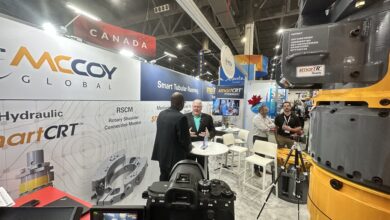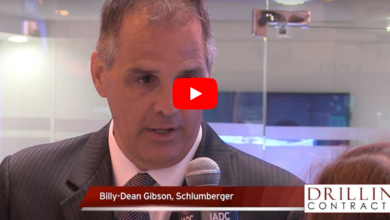Production kicks off from Perdido, world’s deepest offshore drilling and production facility
Shell began producing from its Perdido development project in the U.S. Gulf of Mexico on 31 March. The spar facility sits in about 8,000 ft of water, besting the previous record water depth by more than 50%, according to Shell. The development project will produce initially from three separate fields developed via subsea production systems tied to the spar and will ramp up to annual peak production of more than 100,000 bbls of oil equivalent/day.

“Perdido demonstrates what companies like Shell can do when US federal lands and waters are opened to responsible energy exploration and production,” said Marvin Odum, Upstream Americas Director, Shell Energy Resources Company.
The landmark Perdido development is the first Gulf of Mexico full field subsea separation and pumping system, containing five caisson separators installed on the seabed. This innovative system separates gas and liquids before the hydrocarbons are pumped back to the surface, enabling increased oil recovery by removing about 2,000 psi of back pressure from the wells.

“Gas flows up the riser while liquid is boosted by the electrical submersible pumps using multiphase separation,” said Brad Beitler, FMC Technologies’ vice president of technology.
Utilizing the seabed separation system also reduced the number of production risers to the spar to five, saving significant weight and cost.
“Perdido presented technical challenges unlike we’ve ever seen in the Gulf of Mexico,” Mr Odum said. “Shell’s team used its expertise to open this new frontier and confront complex reservoir characteristics, extreme marine conditions and record water depth pressures.”
Deepwater record
FMC set the deepwater completion record with its EVDT in 9,356 ft of water with a tree installed in the Silvertip field, a part of the Perdido development. The company set the previous deepwater record in 8,995 ft in 2007. However, the latest water depth record could be surpassed later this year with a well planned for the Tobago field that is planned in about 9,600 ft of water which will be completed using an EVDT system.
From the first lease purchase to commencing production, the Perdido Development required an industry workforce of approximately 12,000 people, including employees and contractors. Shell designed and operates the Perdido host spar, which is jointly owned by Shell (35%), Chevron (37.5%), and BP (27.5%).
The facility will produce from the Great White, Silvertip, and Tobago offshore fields, requiring perhaps as many as 35 wells over the life of the fields, according to Shell. Tobago sits in more than 9,600 ft of water and surpasses the world depth record for a completed subsea well. All Perdido subsea fields utilize a unique and innovative subsea separation and boosting system to enable oil and natural gas recovery.

New frontier
“This is a new frontier in many respects,” Mr Odum explained. “Perdido’s floating production facility can be expanded to serve the future potential in the area, and we can apply the technology and expertise utilized at Perdido to other similarly challenging environments in the future.”
Shell developed the gas/liquid separation technology used in the development, and FMC engineered and manufactured the caisson separators that separate gas from liquids and then pump the liquid to the spar.
FMC Technologies’ scope of work for the Perdido development included 17 enhanced vertical deepwater subsea trees (EVDT); five caisson separator assemblies; two 10-slot cluster manifolds; two suction piles; the topside control systems; subsea controls and subsea distribution equipment; 30 slimbore subsea wellheads; valves and hubs for 14 pipeline end terminals (PLETs); and end kits for 29 well and flowline jumpers.
Shell recently announced another deepwater discovery at Appomattox in the Gulf of Mexico, which is in addition to recent exploration success at West Boreas, Vito, and Stones. These discoveries underpin the potential for four new production hubs.
Additional FMC Technologies awards
FMC was also awarded the Perdido Stage II contract to supply the subsea and topside systems for the Perdido Stage II Regional Development Project. FMC’s scope of supply includes five subsea production trees and three subsea water injection trees, each rated at 10,000 psi. FMC will also manufacture and provide subsea and topside controls, manifold and tie-in equipment, and other systems and services. Deliveries will commence in the third quarter of 2010.
“FMC has a long-standing alliance with Shell, in the Gulf of Mexico and with international projects, and we are pleased to continue supporting the Perdido project with our subsea processing technologies and equipment,” said John Gremp, President and Chief Operating Officer of FMC Technologies.
Interesting Perdido facts
- One day’s production from Perdido is equivalent to the energy needed to fuel 500 cars for 15 years;
- First commercial production from the Lower Tertiary reservoir in the Gulf of Mexico;
- First Gulf of Mexico full host subsea separation and boosting removes about 2,000 psi of backpressure from the wells;
- First spar wet tree Direct Vertical Access (DVA) wells in water more than 2 km (1.2 miles) deep;
- The project achieved 10 million hours without a lost time injury;
- Located 200 miles from the Texas coast in Alaminos Canyon Block 857;
- The Great White field represents about 80% of Perdido’s total estimated production;
- Perdido’s project life is expected to be about 20 years.
In the video below, Dale Snyder, Perdido project manager, talks about the project from discovering oil to project delivery.
In this video, Curtis Lohr, spar and mooring team leader, describes the innovative mooring system that allows the spar to move over wells on the ocean floor.




